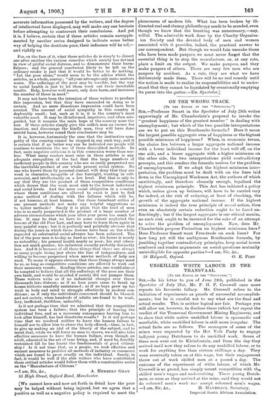ON THE WRONG TRACK.
[To Ting EDITOR OP THE " SPECTATOR:]
SIR,—Professor Smart in the Spectator of July 28th writes approvingly of Mr. Chamberlain's proposal to invoke the "greatest happiness of the greatest number" in dealing with unemployment ; but which of the two possible interpretations are we to put on this Benthamite formula Does it mean the largest possible aggregate sum of happiness or the highest possible minimum of happiness ? When, in economic terms, the choice lies between a larger aggregate national income with a lower individual income for the least well off, on the one side, and a lesser aggregate with a higher minimum on the other side, the two interpretations yield contradictory precepts, and this renders the formula useless for the problem of unemployment. If we adopt the highest minimum inter- pretation, the problem must be dealt with on the lines laid down in the Unemployed Workmen Act, the authors of which unwittingly, and therefore clumsily enough, legalised the highest minimum principle. This Act has initiated a policy which, unless given up betimes, will have to be carried very far indeed, at the risk of reducing, at least of checking, the growth of the aggregate national income. If the highest minimum is indeed the true principle of moral action, then even an absolutely certain reduction ought to be faced un- flinchingly; but if the largest aggregate is our ethical maxim, no such risk ought to be incurred for the sake of an attempt to solve the problem of unemployment. Now, does Mr. Chamberlain propose Protection on highest minimum lines ? Does Professor Smart want Free-trade on such lines? For how long yet will the ambiguous Bentha.mite formula, by jumbling together contradictory principles, keep social issues confused and render arguments on social questions mutually unintelligible for opposite parties P—I am, Sir, &c.,






































 Previous page
Previous page